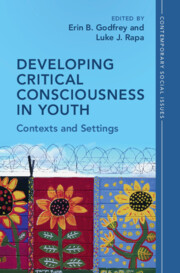Book contents
- Developing Critical Consciousness in Youth
- Contemporary Social Issues Series
- Developing Critical Consciousness in Youth
- Copyright page
- Dedication
- Contents
- Figures
- Tables
- Contributors
- Acknowledgments
- Introduction
- Part I Pedagogical, Curricular, and School-Based Contexts
- 1 Tools of Whiteness and Teaching for Critical Consciousness
- 2 Critical Consciousness Development in the Context of a School-Based Action Civics Intervention
- 3 Critical Consciousness Development in Place-Based Action Civics
- Part II Extracurricular Contexts
- Part III Societal Contexts
- Index
- References
2 - Critical Consciousness Development in the Context of a School-Based Action Civics Intervention
from Part I - Pedagogical, Curricular, and School-Based Contexts
Published online by Cambridge University Press: 11 May 2023
- Developing Critical Consciousness in Youth
- Contemporary Social Issues Series
- Developing Critical Consciousness in Youth
- Copyright page
- Dedication
- Contents
- Figures
- Tables
- Contributors
- Acknowledgments
- Introduction
- Part I Pedagogical, Curricular, and School-Based Contexts
- 1 Tools of Whiteness and Teaching for Critical Consciousness
- 2 Critical Consciousness Development in the Context of a School-Based Action Civics Intervention
- 3 Critical Consciousness Development in Place-Based Action Civics
- Part II Extracurricular Contexts
- Part III Societal Contexts
- Index
- References
Summary
This chapter presents school-based action civics interventions as a setting for critical consciousness (CC) development. Action civics programs guide students to take collective action to address locally relevant civic issues within a context that promotes reflection and skills development. We highlight one action civics program, Generation Citizen (GC), and overlay programmatic components with the core elements of CC to elucidate how action civics may support CC development and where the constraints may be. The features of GC that we propose align with CC development are: placing action at the center of the program; fostering critical social analysis and reflection; valuing children’s right to participation; and focusing on skill-building. Images of youth-generated action civics presentation posters are used to illustrate aspects of CC. Finally, this chapter offers next steps to bridge across CC and action civics theory, research, and practice.
Keywords
Information
- Type
- Chapter
- Information
- Developing Critical Consciousness in YouthContexts and Settings, pp. 41 - 59Publisher: Cambridge University PressPrint publication year: 2023
References
Accessibility standard: Unknown
- 3
- Cited by
